|
|
|
Sort Order |
|
|
|
Items / Page
|
|
|
|
|
|
|
| Srl | Item |
| 1 |
ID:
164556
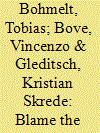

|
|
|
|
|
| Summary/Abstract |
Existing research argues that refugee inflows may increase the risk of domestic conflict, particularly civil war that, by definition, involves the state as an actor. However, many of the postulated mechanisms linking refugees to a higher risk of such conflict pertain to tensions with locals, which do not necessarily involve any grievances against government authorities. We contend that it is more likely to identify an association between refugees and non-state actor violence, that is, armed violence between organized non-state groups, neither of which pertains to the state. We also claim that the extent to which refugees are associated with a higher likelihood of non-state conflict depends on the capacity of governments to manage and mitigate risks. We report evidence that refugee populations can be linked to an increased risk of non-state conflict, as well as for a mitigating effect of state capacity on the risk of non-state conflicts in the presence of refugees. We do not find a clear effect of refugee populations on civil war, suggesting that the link depends on existing conflict cleavages relevant to mobilizing refugees or locals. Our research helps to shed light on the relevant security consequences of managing refugee populations. Despite the common arguments portraying refugees as security risks in developed countries, the risk of non-state conflict applies primarily to weak states that have been forced to shoulder a disproportionate burden in hosting refugees.
|
|
|
|
|
|
|
|
|
|
|
|
|
|
|
|
| 2 |
ID:
164555
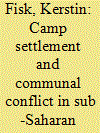

|
|
|
|
|
| Summary/Abstract |
Are areas that host encamped refugees more likely to experience communal conflict, and under what conditions? Building on insights from the refugee studies literature suggesting that settling refugees in camps can intensify intercommunal tension in host communities, this article investigates the effect of refugee encampment on the occurrence of communal conflict at the subnational level in sub-Saharan Africa. It first tests for a general relationship between the overall presence and population intensity of encamped refugees and communal conflict before assessing whether this relationship is moderated by local-level characteristics, including interethnic linkages and political and economic marginalization within the host region. The basic findings show that communal conflict occurs more frequently in regions where refugees are camp-settled. Tests for interactive effects indicate that refugee camps have a significant marginal effect on conflict only if they are located in areas with politically marginalized host groups. Origin country/host region ethnic ties are shown to exert significant moderating effects. Moreover, results from an extended set of analyses show that the form of refugee settlement matters, as the presence and population intensity of self-settled refugees are related to decreases in the occurrence of communal conflict.
|
|
|
|
|
|
|
|
|
|
|
|
|
|
|
|
| 3 |
ID:
164553
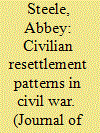

|
|
|
|
|
| Summary/Abstract |
This article proposes a descriptive typology of civilian resettlement patterns in civil wars. The patterns vary in two dimensions: whether or not displaced civilians cluster together or resettle independently, and if they remain within their home country or not. The combination of the factors leads to four resettlement patterns: expulsion, segregation, integration, and dispersion. Expulsion and segregation occur when the displaced cluster, either within the home state (segregation) or beyond it (expulsion). Integration and dispersion occur when the displaced do not cluster but seek to blend in with other communities, either abroad (dispersion) or within core cities and towns in the state (integration). After introducing the typology and illustrating it with examples, the article engages in theory-building to explain variation in resettlement patterns. It argues that resettlement forms are based on the type of displacement that civilians experience, and the perpetrator of the violence. The displacement type influences individuals’ best strategy for achieving relative safety. Within and across wars, groups that experience political cleansing are likely to cluster together for safety. The best destination options for the displaced to resettle depend on the perpetrator, which lead to clustering either within a state if the actor is non-state, or outside the state if the actor is the state or an ally. The argument is illustrated with examples. Finally, the article considers the implications of resettlement patterns for violence, conflict, and state-building.
|
|
|
|
|
|
|
|
|
|
|
|
|
|
|
|
| 4 |
ID:
164557
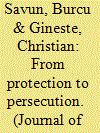

|
|
|
|
|
| Summary/Abstract |
The security consequences associated with refugee flows are among the most widely studied aspects of forced migration. While the majority of this research program has focused on how refugee movements affect the risk of political violence, scant scholarly attention has been paid to violence perpetrated against refugees. Building upon the state repression literature, we argue that refugees are particularly vulnerable to the violation of their physical integrity rights in the wake of terrorist attacks in host states. Governments are pressured to respond to security crises but prefer to take actions without jeopardizing public support. In this context, refugee groups can be strategically attractive targets of repression because they lack electoral power and citizens are often supportive of government crackdown against foreigners in times of security crises. Given that leaders have stronger incentives to respond to voters’ demands quickly in democracies, we expect the effect of terror attacks on violence against refugees to be stronger in democratic host states. Using a novel global dataset on anti-refugee violence between 1996 and 2015, we show that refugees are more likely to be exposed to violence by the coercive agents of the state in the wake of security crises. We provide suggestive evidence that the repression of refugees is more consistent with a scapegoating mechanism than the actual ties and involvement of refugees in terrorism. The findings reveal that the well-being of uprooted populations is particularly at risk when host countries face a security threat.
|
|
|
|
|
|
|
|
|
|
|
|
|
|
|
|
| 5 |
ID:
164560
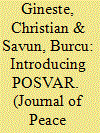

|
|
|
|
|
| Summary/Abstract |
While scholars have for some time debated the role of refugee flows in the international spread of conflict, most evidence has been indirect due to the scarcity of systematic data on refugee-related violence. The Political and Societal Violence By And Against Refugees (POSVAR) dataset addresses this lacuna by providing cross-national, time-series data on refugees’ involvement in acts of physical violence in their host state, either as the victims or the perpetrators of violence, individually or collectively, in all countries between 1996 and 2015. In this article, we provide an overview of the main features of the dataset, identify its limitations, and trace variation in reported levels of refugee-related violence over time and across different types of actors. We emphasize that the data may be helpful to both researchers and policymakers for more accurate understanding of the prevalence of refugee-related violence and the design of more optimal policies to mitigate it.
|
|
|
|
|
|
|
|
|
|
|
|
|
|
|
|
| 6 |
ID:
164552
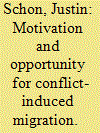

|
|
|
|
|
| Summary/Abstract |
How do civilians decide when to leave their homes during conflict? Existing research emphasizes the role of violence in driving civilian migration decisions. Yet, migration timing often does not correspond with the timing of violence. To explain this discrepancy, I argue that violence fits within broader considerations of motivation and opportunity to migrate. Witnessing violence triggers post-traumatic growth that delays narrative ruptures and the subsequent migration that they motivate. Civilians who have ‘wasta’ – an advantaged social position resulting from some combination of money and connections – have the opportunity to migrate safely. Civilians who possess both motivation and opportunity migrate earlier. I use over 170 structured interviews with Syrian refugees in Turkey to test this argument. Descriptively, respondents who did not witness violence (early motivation) left their homes seven months earlier, on average. Respondents with wasta (opportunity) left their homes one full year earlier, on average. Respondents who both did not witness violence (early motivation) and had wasta left their homes approximately one and a half years earlier, on average. Cox proportional hazard models reveal that respondents only migrated earlier in the conflict if they had both early motivation and opportunity. Open-ended responses from the interviews support the quantitative results and help explain their causal mechanisms. These findings contribute to understandings of conflict-induced migration, civil war, and the Syrian conflict.
|
|
|
|
|
|
|
|
|
|
|
|
|
|
|
|
| 7 |
ID:
164558


|
|
|
|
|
| Summary/Abstract |
Civilians who have fled violent conflict and settled in neighboring countries are integral to processes of civil war termination. Contingent on their attitudes, they can either back peaceful settlements or support warring groups and continued fighting. Attitudes toward peaceful settlement are expected to be especially obdurate for civilians who have been exposed to violence. In a survey of 1,120 Syrian refugees in Turkey conducted in 2016, we use experiments to examine attitudes towards two critical phases of conflict termination – a ceasefire and a peace agreement. We examine the rigidity/flexibility of refugees’ attitudes to see if subtle changes in how wartime losses are framed or in who endorses a peace process can shift willingness to compromise with the incumbent Assad regime. Our results show, first, that refugees are far more likely to agree to a ceasefire proposed by a civilian as opposed to one proposed by armed actors from either the Syrian government or the opposition. Second, simply describing the refugee community’s wartime experience as suffering rather than sacrifice substantially increases willingness to compromise with the regime to bring about peace. This effect remains strong among those who experienced greater violence. Together, these results show that even among a highly pro-opposition population that has experienced severe violence, willingness to settle and make peace are remarkably flexible and dependent upon these cues.
|
|
|
|
|
|
|
|
|
|
|
|
|
|
|
|
| 8 |
ID:
164554
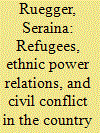

|
|
|
|
|
| Summary/Abstract |
Many countries that face forced migrant inflows refuse to admit these uprooted people premised on negative externalities such as increased insecurity associated with refugee presence. Also, the academic literature on civil conflict identified refugee movements as a factor contributing to the regional clustering of war. Case-based evidence suggests that refugees can disturb the ethnic setup in the country of asylum and thereby trigger instability. To enhance the yet limited systematic understanding of the role of refugees in violent conflicts, this study examines the linkage between forced migrants, transnational connections, and ethnic civil conflict in the country of asylum with a large-N analysis, 1975–2013, arguing that ethnic power politics in the asylum state are determinant for intrastate conflict onset after a refugee influx. Statistical analysis finds that groups are particularly prone to conflict if they are excluded from governmental power and simultaneously host ethnic kin refugees, because a co-ethnic refugee influx enlarges the demographic and political leverage of the kin group, possibly resulting in clashes with other groups in the country. Hence, refugees alone do not consistently influence armed violence – only in combination with political tensions in the receiving country. Therefore, host governments should pursue inclusionary policies towards their population, to prevent dangerous instability, instead of closing borders or blaming refugees for domestic problems.
|
|
|
|
|
|
|
|
|
|
|
|
|
|
|
|
| 9 |
ID:
164551
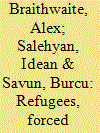

|
|
|
|
|
| Summary/Abstract |
Few issues in international politics have dominated public debates, both in domestic and international arenas, as much as refugee movements across borders in recent years. By the end of 2017, more than 68.5 million people – one in approximately every 110 people on the planet – had been displaced from their homes, either as internally displaced persons (IDPs) or as refugees, due to violent conflict, persecution, famine, or natural disasters. This article introduces a special issue on refugees, forced migration, and conflict. It describes the evolution of the international refugee regime and identifies theoretical and methodological advances in the relevant literature. It concludes with a discussion of the individual contributions to the issue, which seek to address gaps in the literature with respect to explaining motivations for refugee departures, understanding the relationship between refugee populations and political instability in host countries, and tracking public attitudes towards hosting refugee populations.
|
|
|
|
|
|
|
|
|
|
|
|
|
|
|
|
| 10 |
ID:
164559
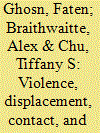

|
|
|
|
|
| Summary/Abstract |
How do individuals’ personal experiences with various aspects of political violence affect their attitudes toward hosting conflict refugees? More specifically, how do their personal exposure to violence, their own personal experience of being displaced, and their recent contact with refugees influence these attitudes? To explore answers to these questions, we draw upon a recent survey of 2,400 Lebanese residents where we identify individuals who experienced violence during the Lebanese civil war (1975–90), those forced to flee their homes during that conflict, and those who enjoy recent contact with Syrian immigrant and/or displaced populations. We examine whether these distinct experiences affect respondents’ regard for members of the Syrian refugee population. Results demonstrate that historical exposure to violence and experience of displacement have no discernible impact on individual attitudes toward hosting refugees. We find much stronger evidence that attitudes are associated with whether individual respondents have had contact with Syrians in Lebanon; those with such interactions are significantly more likely to support hosting refugees, to consider hiring a refugee, or to allow one of their children to marry a refugee. Our findings suggest exposure to violence by itself does not correlate to positive sentiments toward refugees, especially over time. Further, finding ways to create positive contact between refugees and native populations may be associated with improving attitudes and relations between the two populations.
|
|
|
|
|
|
|
|
|
|
|
|
|
|
|
|
| 11 |
ID:
164561
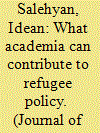

|
|
|
|
|
| Summary/Abstract |
This conclusion to the special issue highlights the role of scholars in advancing the public discussion about forced migration. As countries around the world are adopting increasing restrictions on the entry of refugees, academic research can help to dispel some of the myths and apprehensions regarding the risks that forced migration entails. While refugees may be linked to conflict and violence in limited circumstances, the research generally demonstrates that robust international cooperation to manage refugee settlements, provide adequate humanitarian assistance, and integrate refugees into host communities, among other policies, can help to mitigate potential risks. Directions for future research and analysis are also discussed. Forced migration scholars should endeavor to collect more individual-level data; seek to understand factors that exacerbate or reduce security risks associated with cross-border militancy; conduct research on the long-term integration of refugees; and seek to understand the causes and consequences of resettlement and repatriation policies.
|
|
|
|
|
|
|
|
|
|
|
|
|
|
|
|
|
|
|
|
|